Hay fever and antioxidants
March 12, 2021
Hay fever and antioxidants
In the article “Is hay fever related to oxidative stress?”, I explained that oxidative stress damages immune cells and is one of the causes of hay fever.
The relationship between hay fever and oxidative stress
Here are some data on the relationship between hay fever and oxidative stress, when hay fever sufferers lower their oxidative stress.
First, here are the results of a questionnaire about hay fever symptoms.
How long have you had hay fever? (Single answer)

Please select the symptoms of hay fever that apply to you. (Multiple answers are acceptable)
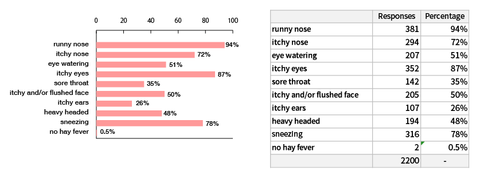
Do you use any medication bought at a pharmacy or prescribed by a doctor to prevent hay fever? (Swallowing medication, eye/nasal drops, etc., single answer)
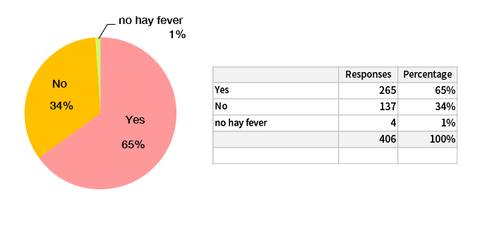
From 406 respondents who answered our questionnaire about hay fever, we received the cooperation of 102 people.
The attribute data is as follows.

Gender

After answering the questionnaire, we asked the participants how their hay fever symptoms improved after taking the developed formula, Twendee X, for about 8 weeks from February to the end of March 2017. We asked the participants to answer in a questionnaire.
Did you experience any hay fever symptoms after taking Twendee X? (single answer)
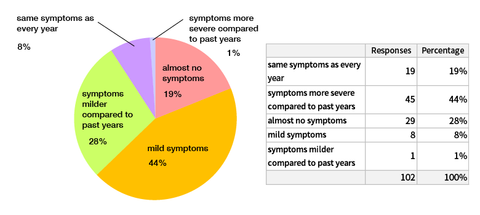
19% had almost no symptoms
44% had symptoms, but they were mild.
28% had hay fever symptoms but they were milder than usual.
Did your hay fever symptoms get better after taking Twendee X for about 2 months? (single answer)
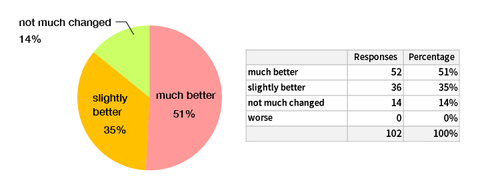
In terms of data on whether the symptoms themselves have improved
Much better: 51%
Slightly better: 35%
Not much change: 14%.
This is the result.
Please write down the symptoms that have gotten better or worse.
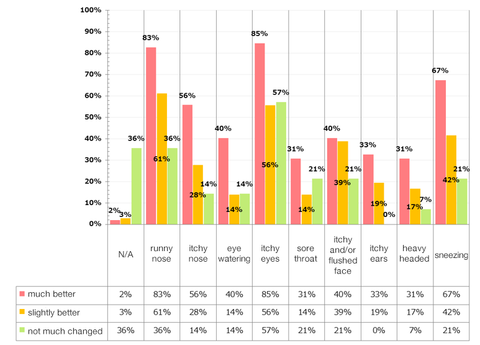
If you have been using medications other than Twendee X, have you changed the amount of medication or nasal/eye drops you use? (single answer)
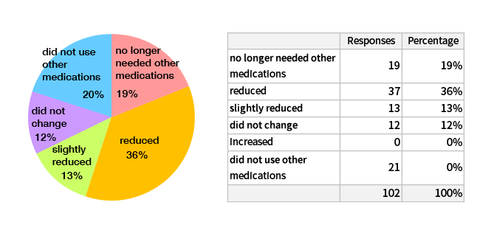
19% no longer need other medications
Fewer medications (36%)
Slightly reduced: 13%.
Looking at this data, we can see that about 70% of people have reduced their medication. This data shows that about 70% of people have reduced their medication.
Did you know that oxidative stress is related to hay fever? (single answer)
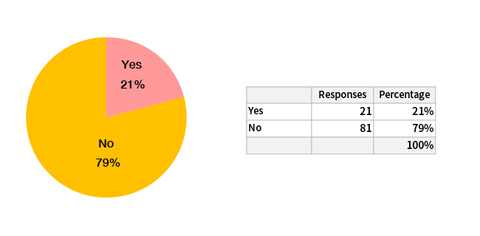
About 20% of the respondents knew that hay fever is related to oxidative stress.
80% of the respondents did not know at all.
These results indicate that hay fever is not well known to be related to oxidative stress, but lowering oxidative stress can help reduce hay fever symptoms.
Currently, there are various guidelines for hay fever treatment.
If you have severe symptoms, it is recommended that you see a specialist as much as possible and get the right medication for your individual symptoms.
Also, it is recommended that you understand that surgical and laser treatments do not have lasting effects. For example, if you have an entrance exam this year, so you want to do something about it only at that time. In that case, it may be a good idea.
I would like to recommend that you do not simply take Chinese herbal medicine for a “long time”.
Originally, Chinese herbal medicine was meant to be taken for a short period of time in order to improve a condition that has become worse. Continuing to use any one type of Chinese medicine for six months or a year may inevitably lead to side effects and dependence.
Lastly, the well-known “sublingual immunotherapy” may cause allergic reactions such as swelling in the mouth, but unlike injections, “sublingual immunotherapy” almost never causes anaphylactic shock. However, it requires a long-term treatment of about three years and can only be administered by a doctor who is certified in sublingual immunotherapy.
The other thing to do is to “lower oxidative stress”. I hope you will remember that this is also a good way to prevent hay fever.

